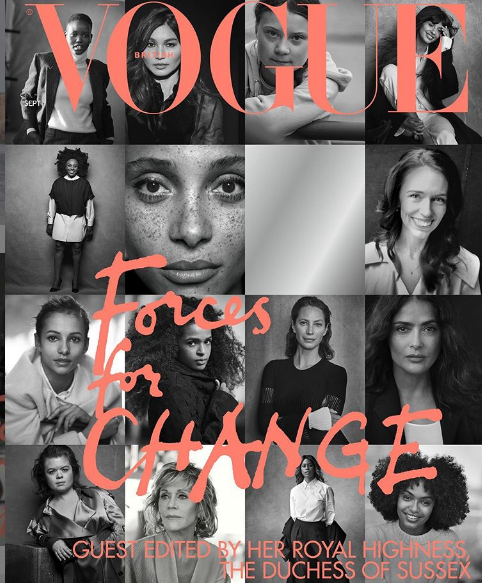
Since it's a good few weeks since Meghan, Duchess of Sussex, has worn jeans to Wimbledon, carried her baby the wrong way or used a shawl made by impoverished workers, her mentors have been on the alert for further evidence that their continual inspection of this member of the Royal Family is not racist bullying but a series of pedagogic opportunities. They wish only to help her improve.
But her worst enemies, with which the UK press is strangely well supplied, could not have anticipated that Meghan's next gift to them would be something so lavish, so rich in opportunities for point-by-point demolition, as an entire edition of Vogue, guest-edited while she was on maternity leave. That's around the same time, Piers Morgan has pointed out, as she was not meeting his racist and sexist friend Donald Trump. A learning moment, then: see how the other Royals dressed up for Trump and what a boon that has proved for Anglo-US relations?
Even her supporters may wonder if there is something marginally more inspirational a famous gifted person might choose to do than help shift copies of Conde Nast's September money-spinner, notwithstanding Vogue's tradition of cover princesses. If it's quite refreshing to discover a Q&A with Michelle Obama, a charity project and - least royal of all - a poem, this is still Vogue and in the business of urging women to (a) subscribe to its culture of eating-disordered ageism and (b) buy more useless s... .
If anything, a socially responsible, duchess-edited September issue fulfils, as never before, Vogue's editorial challenge: to temper conspicuous consumption with occasional glints of awareness without frightening the advertisers.

Right now, for instance, as well as being super-excited about featuring the non-models Chimamanda Ngozi Adichie, Greta Thunberg and Jacinda Ardern among Markle's "Forces For Change'' cover women, the magazine is thrilled to report, in forces for obsolescence news, that Victoria Beckham, one of its favourite heads on a stick, has been posing, all sciency, in a lab coat: a chance for it to help generate, with some verbatim marketing copy, interest in her new range of women-focused detritus: "VB Beauty as a digital-native brand''.
If she can't eradicate these blots on her vision, Meghan does address them in an obligatory "you may say I'm a dreamer'' section of her introduction: "There will be advertising sections that are requisite for every issue, so while I feel confident that you'll feel my thumbprint on most pages, please know that there are elements that just come with the territory.''
Moreover, she might have added, her father-in-law has twice guest-edited Country Life, regardless of the incompatibility between its property porn and princely jeremiads about unfettered materialism.
But the collision of Meghan's "great fear of shallow living'' with Vogue's incitement to insatiable acquisition ("anklets are back to make bare legs the centre of attention''!) is not, it emerges, what troubles prominent critics. Rather, the UK's finest Meghan-assassins have alighted on her most striking advance on the Vogue norm: the cover women. They are variously too BAME - black, Asian and minority ethnic - too famous, not famous enough, too political, too unpolitical and not, it's generally agreed, the Queen.
Morgan, the UK's Meghan finder general, complains that only five of the women were British and none was male. "So it's not actually inclusive at all.'' Jameela Jamil particularly distresses this loyal Trumpian, on account of her incivility. Elsewhere, Sarah Vine draws on personal experience of state-funded decor and the careful choice of friends to counsel "dear Meghan'', as she calls this outsider, on "proper royalty''. "Ask the Queen.''
It's not a bad idea. The Queen's success in protecting her reputation from less impressive friendships, such as with the troubled ruler of Dubai, does contrast favourably with the damage to Meghan's of fashionable allies whose names have never, unlike the sheikh's, featured in UK courts in connection with feared abduction and forced marriage.
Meghan might further benefit, at this wobbly stage on her learning curve, from instruction by another fully inducted Royal, Prince Andrew, formerly a close friend and house-guest of Jeffrey Epstein, the US sex offender currently jailed and accused of trafficking and sexually assaulting young girls. In 2015, one alleged that she had been coerced into sex with Andrew, an allegation he denied. While massed commenters expose the threat to the royal reputation posed by Meghan's lamentable female associates, Andrew's name has featured only occasionally in connection with the latest revelations about Epstein, which include the latter's plans to populate the world with his own gene pool and have his head and penis frozen for perpetuity.
Proper royalness, in such situations, possibly explains why HRH, as an unapologetic pervert's companion, is still deputising for his mother, if not the Foreign Office, and largely untroubled by the same press moralists who argue that Meghan doesn't understand the traditional role of the monarchy. On the other hand, given the comparative expressions of disquiet, perhaps Meghan's recent offences really do exceed Fergie's, in 2011, when she welcomed a £15,000 loan (organised by Prince Andrew's office) from the recently released Epstein. Was it ever repaid?
Next, as part of the supplementary training now widely proposed for our clumsy royal apprentice, she could study how Prince Charles' reputation survived devoted friendships with - to date - three paedophiles: Laurens van der Post, Jimmy Savile and an already cautioned offender, Peter Ball. Meghan's Instagram account alone has generated more hostile press than the recent conclusion of the independent inquiry into child sexual abuse that the prince's support for Ball was "misguided''.
How have the above Royals avoided relentless Meghan-style bollockings on account of, variously, execrable judgement, bad taste, susceptibility to wealth and/or flattery?
There must, surely, be something more to it than having white skin.
Catherine Bennett is an Observer columnist.












